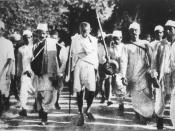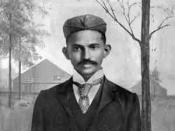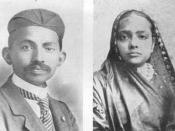Mohandas Karamchand Gandhi
Mohandas Karamchand Gandhi (1869-1948), the Mahatma, the "great-souled one," of Hinduism and the statesman-pacifist guru if India's struggle for political liberation, developed an intriguing and far-reaching philosophy of community. That philosophy, put into practice as the entire world watched, was uniquely bound up with his views about the ashram, a communal retreat, and his commitment to Satyagraha, nonviolent disobedience to unjust laws and unfair social and political practices. Both satyagraha and the ashram are united in Gandhi's concept of the ashramic community.
Mohandas Gandhi's Life
Mohandas Karamchand Gandhi was born in Gujarat, a province on India's Western coast. He came from the Vaishya class, the merchant class, of the Indian social system, though both his father and grandfather had been prime ministers in the government of local, princely states. In his famous An Autobiography, which he subtitled The Story of My Experiments with Truth, Gandhi tells of his early life and marriage in India.
He tells of his adventures as a student in London where he went for study at the age of eighteen and where he obtained his degree in law three years later. He also tells of his early life in South Africa, where he practiced law, and of his later life in India, where he had his most popular success as both a political and spiritual leader of millions of his countrymen.
But it was Gandhi's experiences in South Africa that shaped him for his later work of social reform and active political resistance against the British occupation of India. And it was those early experiences in South Africa, applied subsequently in India, that were to lead in no small measure to the eventual freedom of his country from British rule in 1947.
Gandhi had returned to India from London with his new...



Duplicate Submission
I'm appreciative of your good essay on Gandhi's philosophy of non-violence and how it spread in the United States under the influence of such men as Martin Luther King, Jr. Mohandas Gandhi and Martin Luther King were two of the more prominent spokesmen in the twentieth century for change. Although some advocated violent means for bringing about reforms, time has proven these two men to have been correct in their approach to improving the lot of their people. Your report was extensive and well structured. The use of headings made your paper easier to read. The works cited should be useful to those who wish to do further research in this area and would have been more helpful if additional bibliographical information could have been provided. Impressive! Of course, you only need to submit your paper once.
7 out of 7 people found this comment useful.